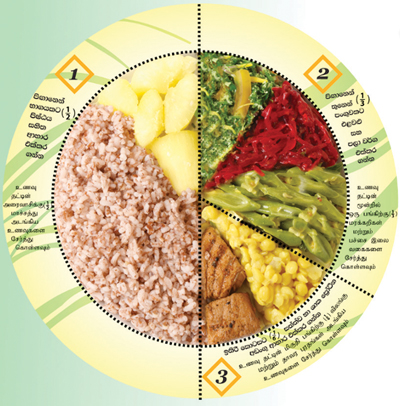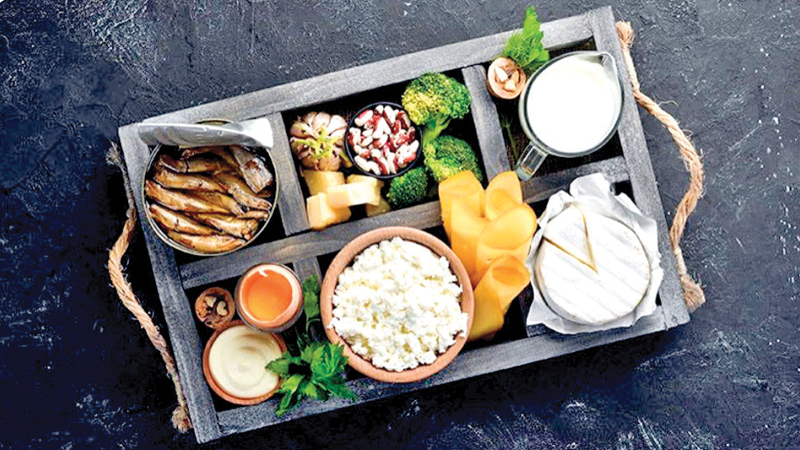 As Christmas dawns in a few hours time, many families will gather together to indulge in rich sugar and oil laden foods putting their usual diets on hold for a short while.
As Christmas dawns in a few hours time, many families will gather together to indulge in rich sugar and oil laden foods putting their usual diets on hold for a short while.
The Sunday Observer spoke to Consultant Cardiologist, teaching Hospital, Kuliyapitiya Dr. Wasantha Abeywickrama to tell us how we can enjoy the festive season while protecting our heart .
Excerpts.
Q: Tomorrow will be the dawn of Christmas heralding a week long of festivity, as families re-unite and indulge in the rich sugar and oil laden foods while temporarily putting their self imposed or prescribed diets on hold. As a heart specialist, do you see any adverse impacts when persons with already compromised immune systems like diabetes and cholesterol put their prescribed diets on hold just to enjoy the family meals like everyone else ?

Dr. Wasantha Abeywickrama
A. Yes. You may have heard of the “ABCs of diabetes.” This refers to three aspects of your health that should be well-controlled in order to manage your diabetes: A HBA1C (a blood test that measures your average blood sugar level over the past few months), Blood pressure, and Cholesterol. Keeping your blood sugar at or near your goal level helps decrease the risk of complications that can affect the eyes, kidneys, and nerves. Keeping your blood pressure and cholesterol levels under control helps reduce your risk of cardiovascular (heart) disease, which is a common complication of type 2 diabetes. Having high sugary and cholesterol diets during the season affects the health.
Q: Is there any way that other members of the family can help their older relatives with pre-existing health problems to enjoy the season while at the same time protecting their heart?
A. For people with diabetes, some examples of carb sources to limit include white rice and anything made with white flour only, such as white bread, white pasta, some cereals, some crackers. Foods high in sugar including baked goods, such as doughnuts, croissants, cakes, and cookies, as well as pizza dough should also be avoided.
Q: What cooking methods can you recommend for those with compromised immune systems? Should they be fried? Steamed? Cooked? Boiled?
A. Boil, steam, bake, or grill meats and vegetables. Don’t fry them. Flavour foods with vegetable purée, lemon or lime juice, or herb seasonings. Don’t use cream-based sauces or sugary glazes.
Steaming
 This is a healthy and simple option. The nutrients, colour and texture of fresh vegetables are better preserved as the food is not in contact with the water.
This is a healthy and simple option. The nutrients, colour and texture of fresh vegetables are better preserved as the food is not in contact with the water.
Frying
Fried foods are unhealthy because adding fat increases the calories and the high heat destroys a lot of the nutrients.
Boiling
Although this is a fat-free cooking method, nutrients, such as vitamin C and folate, are lost in the water. Using less water will help preserve the vitamins and minerals in your vegetables.
Q: What about the oils used to cook them? Are there safe oils that could be used when cooking for people with compromised immune systems?
A. Try to avoid oil as much as possible. If you do use oil, choose olive, avocado, corn, peanut, sunflower, vegetable, or flaxseed oil.
Q: Fizzy drinks like ginger beer, coca cola are by far some of the most popular drinks served for the younger members of the family. As most children today lead sedentary lives with little exercise, and very little active play outside their house , do you think that excessive drinking of these fizzy drinks could lay the foundation for early development of heart and other diseases like diabetes in them?
A. Sweetened, sugary drinks can cause sharp rises in blood sugar levels for people with diabetes or glucose intolerance (including pre-diabetes and gestational diabetes) and so it’s usually best to avoid drinking sugary drinks. People who consume sugary drinks regularly—1 to 2 cans a day or more—have a 26 percent greater risk of developing type 2 diabetes than people who rarely have such drinks. Risks are even greater in young adults .
Q: So what options do parents have when it comes to serving their children with drinks they could enjoy at this time around, but still help lay the foundation for a healthy heart for their future ?
A. Habits begin in the earliest years. Children watch, imitate and learn by interacting with you. They want to do what you do. So it’s more healthy for all the family to have fruit juices rather than sweetened beverages.
I think home made fruit juices are much healthier than the beverages we see in the markets laden with too much sugar and salt.
Q: This is also the time when the more affluent families pull out their best bottles of wine . How safe is it to drink a glass of red wine or white wine when you are a diabetic or a person with a heart condition or high pressure and cholesterol?
A. Effects on blood sugar aside, there is some evidence that red wine might provide benefits to people with type 2 diabetes. But stick with a small glass of red wine. Moderate red wine consumption is associated with increased HDL levels, the “good” cholesterol that helps remove unhealthy cholesterol from your blood vessel walls. However, recent studies show there is no safe limit for alcohol consumption.
Q: What about beer? Or stout? ? Is it safer than wine?
A. No. Beer contains more carbohydrates than wine.
Q: In the less affluent homes , those celebrating Christmas indulge in arrack while those on the lowest rung of society use moonshine. Your comments ?
A. Methanol, or methyl alcohol, is a by-product of the distilling process. A principle ingredient in fuel, pesticides, paint thinners, and much more, consuming methanol isn’t something that should be taken lightly. Given its lack of regulation, and no effective way to test for methanol, drinking moonshine can be dangerous to anyone. Steer clear of inexperienced distillers, or people you just don’t trust. It could be the difference between life and death.
Q: Most men at home during the festive season relax with a smoke. Is this a good thing?
A. Smoking harms nearly every bodily organ and organ system in the body and diminishes a person’s overall health. Smoking causes cancers of the lung, esophagus, larynx, mouth, throat, kidney, bladder, liver, pancreas, stomach, cervix, colon, and rectum, as well as acute myeloid leukemia.
Smoking also causes heart disease, stroke, aortic aneurysm (a balloon-like bulge in an artery in the chest), chronic obstructive pulmonary disease (COPD) (chronic bronchitis and emphysema), diabetes, osteoporosis, rheumatoid arthritis, age-related macular degeneration, and cataracts, and worsens asthma symptoms in adults.
Smokers are at higher risk of developing pneumonia, tuberculosis, and other airway infections. In addition, smoking causes inflammation and impairs immune function.
Q: Apart from the adverse impacts they suffer from, could non-smokers (passive smokers) in the same crowded room also run similar risks by inhaling the smoke?
A. Yes. All smoke from burning nicotine products contains harmful chemicals (toxins). Even nonsmokers inhaling other people’s smoke breathe in these toxins. Side stream smoke from the end of a cigarette, cigar or pipe is unfiltered. It has more harmful toxins than mainstream smoke that someone breathes out.
Q: We are still in the midst of a Covid-19 outbreak as well as other new infectious diseases. Since Covid-19 guidelines and social distancing is difficult at this time around, and masks are put aside, hugging and kissing becomes normal instead of the elbow bump or hand clasped greeting when families reunite for Christmas and the New Year in a week’s time, what do you perceive as being the adverse health impacts on those who are exposed to these risks by not adhering to the safety rules?
A. Covid-19 is highly infectious and can easily spread from one person to another. When there are large celebrations or social gatherings the chances of the infection spreading are very high. Practising social distancing aids in reducing possibilities for transmission of the virus.
In this way, we can minimise the number of unwell individuals and lower the load on healthcare systems and elderly in-home care providers. Similarly, social distancing aids to stop a fast spike in people that are influenced by the disease.
Q: What is the role of the parent in helping children to spend their Christmas holidays outside the homes instead of being glued to their television and computer games?
A. Limiting screen time is recommended in general to improve behavior, cognitive performance, and form healthy habits like getting good sleep. When you set up firm limits on how much screen time your child gets, you have an opportunity to encourage them to do something physical instead. One of the most important things to consider when encouraging your child to be physically active is giving them a safe and secure place to play. Organising activities for the family will provide great opportunities to get moving. Whether it’s a hike, a walk, or exploring a new place on bike or foot, being active together will show your child that they’re not the only ones required to follow this rule. Plus, it’s fun and can provide valuable family time and bonding moments.
Q: Looking back at this year, do you see a significant increase in the number of diabetic as well as other patients with pre-existing conditions being admitted to your hospital for treatment?
A. Yes. I think the main reason is unhealthy foods and physical inactivity.
Q: I understand that many of them are also younger patients instead of mostly patients above 65 years as before as associated with heart patients in Sri Lanka. Is this true? Why?
A. The younger population is often unaware that they may be at risk and may fail to take the appropriate actions that could save their lives. Educating parents, adolescents, and young adults about the different risk factors is the best way to help prevent death and reduce problems associated with cardiac disease.
In particular, childhood obesity has quickly become a global epidemic where 1 in 10 children are estimated to be overweight. Obesity can lead to precursors for CVD such as dyslipidemia (high cholesterol), hypertension (high blood pressure), type-2 diabetes, and metabolic syndrome. If these conditions are left unchecked, premature cardiovascular disease can occur, leading to significant health problems in young adults.
Q: Does Sri Lanka have access to the new technology now available in most countries to early detect, prevent and treat patients with complicated heart diseases ? Is it free for all patients In state hospitals
A. Yes. Almost every major state hospital has the facilities for screening.
Q: With Christmas falling tomorrow and the New Year in a week’s time, as a heart specialist, do you have a word of advice to our readers on how they can enjoy the festive season while protecting their health, especially their heart ?
A. If you are a diabetic with a heart condition continue your medication.
Slow dancing may be a good exercise. Minimise alcohol consumption.Just taste or take a small quantity of sweet. Keep a low threshold to have sugar levels checked if you are in doubt.









